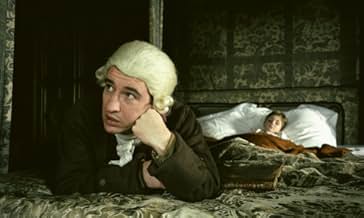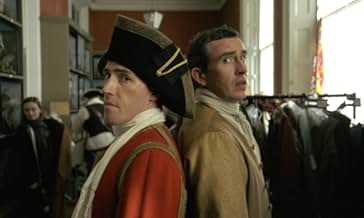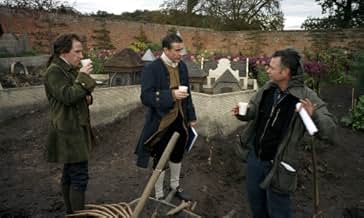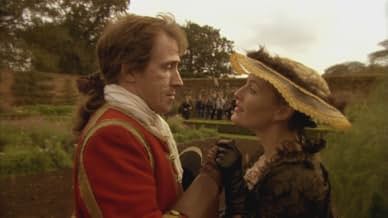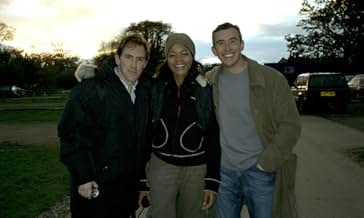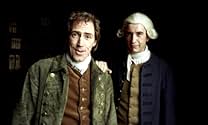Director Michael Winterbottom (Northam) attempts to shoot the adaptation of Laurence Sterne's essentially unfilmable novel, "The Life and Opinions of Tristram Shandy, Gentleman."Director Michael Winterbottom (Northam) attempts to shoot the adaptation of Laurence Sterne's essentially unfilmable novel, "The Life and Opinions of Tristram Shandy, Gentleman."Director Michael Winterbottom (Northam) attempts to shoot the adaptation of Laurence Sterne's essentially unfilmable novel, "The Life and Opinions of Tristram Shandy, Gentleman."
- Director
- Writers
- Stars
- Nominated for 1 BAFTA Award
- 2 wins & 14 nominations total
- Director
- Writers
- All cast & crew
- Production, box office & more at IMDbPro
Featured reviews
Before getting on to what I thought of the film, let's just get some of the big problems out in the open. Firstly those looking for an adaptation of the book will be disappointed to find that very little of the content is on the screen because the script uses it more as a frame and a guide for essentially a behind-the-scenes mockumentary about making the film of the book. It does go someway to backing up the claim that the book is "unfilmable" because this film certainly hasn't managed it. Secondly, by being all post-modern and having actors playing a version of themselves the film will alienate viewers who don't get it and feel that it is all too clever for its own good; likewise it may have people feeling that it has all been done before indeed by the very same people in fact.
However, that said, it is hard for me to ignore the fact that it was tremendous fun. Taking its lead from the novel's constant digressions, the film cannot stick on anything long and as we open the film jumping around the events around Tristram's birth, we soon find that we have jumped behind the scenes and into the lives of those involved. It is a brave move and one that doesn't totally work but it is surprisingly easy to go along with. In terms of the treatment of the novel I felt it did well because it made me want to read the book. We are told enough about the novel to develop an interest in it and know what it is about and it may be a very wise decision to have avoided tackling something that everyone says couldn't be done. Some parts of the book are told as they would have been in a "proper" filmed version but some are not one scene is actually Coogan's nightmare and features Brydon playing his big scene with Gillian Anderson with a Roger Moore impression.
In the place of a straight adaptation what we get is a wonderfully funny look at stars, period dramas, British film-making, celebrities and so on. It has very little structure to speak of but what it does have is a natural development, humour and delivery that makes it interesting and constantly fresh. I wasn't laughing every second because it isn't that type of comedy but occasionally it was very funny, producing some great scenes and some great dry wit. The "story" (if there is one) focuses on Coogan his pedantic fame, his exploits and generally the exaggerated version of himself that he has played before. This keeps the film moving forward by providing one central point of reference for everything else to happen around so, although it does feel very fragmented and distracted, really it is more structured than it appears. The most amusing moments do come from the post-modern looks at Coogan's insecurities, the contrast of his family life with the exploits with the stripper etc and generally it makes the film interesting because it does convince as a "reality" of a sort. Having said that though, the film does have some hysterical bits that just hang there by themselves; for example Brydon's Coogan impressions are hilarious, as is the Al Pacino discussion over the end credits.
The cast list reads like a who's who of British film and television some in main roles but many in semi-cameos who do the goods and then move on. Coogan is naturally the star (no matter what Brydon thinks!) and, although he has played a version of himself or addressed the camera in a post-modern way before, it still works well here. He is convincing and natural and it helps the film produce this "reality" that it really does heavily rely on. Brydon perhaps relies a bit too heavily on impressions but generally he is just as good and the scenes he shares with Coogan tend to be some of the funniest. Although she has largely been overlooked as the critics name names and hand out praise, I think that Naomi Harris deserves a lot of credit for her performance here. Left with a more serious thread to carry, she turns in a totally convincing performance to the point where I could easily believe this is who she is. She also produces an engaging thread around her desire for Coogan, despite having little to work with. I'll admit that I have liked her in most things I have seen her do, find her very attractive and did slightly fall for her "chilled, cool dressing film buff" character (ok, a bit more than slightly) but I still thought she was easily the best performance in the whole film.
The rest of the cast work well within the "reality" of the film and generally produce laughs. Faces like Moran, Fry and Walliams provide some comedy but are little more than cameos. Northam and Anderson are good and support is generally very good from people like Macdonald, Hart, Henderson and others. Winterbottom pulls off the seemingly impossible of holding it all together as director and moving well within the novel and reality both in terms of story telling but also visually.
Overall this will please as many people as it p*sses off I think. Taking the manner of telling of the novel (distracted and digressing) the film moves from a straight telling into a spoof of reality. Saying it like this sounds dull and "seen it all before" but it is an impressive piece of film-making that is brave and, even better, works. As brilliant as it is flawed, this is certainly worth a try whether you know the book or not because, simply put, it is tremendous, tumultuous fun.
However, that said, it is hard for me to ignore the fact that it was tremendous fun. Taking its lead from the novel's constant digressions, the film cannot stick on anything long and as we open the film jumping around the events around Tristram's birth, we soon find that we have jumped behind the scenes and into the lives of those involved. It is a brave move and one that doesn't totally work but it is surprisingly easy to go along with. In terms of the treatment of the novel I felt it did well because it made me want to read the book. We are told enough about the novel to develop an interest in it and know what it is about and it may be a very wise decision to have avoided tackling something that everyone says couldn't be done. Some parts of the book are told as they would have been in a "proper" filmed version but some are not one scene is actually Coogan's nightmare and features Brydon playing his big scene with Gillian Anderson with a Roger Moore impression.
In the place of a straight adaptation what we get is a wonderfully funny look at stars, period dramas, British film-making, celebrities and so on. It has very little structure to speak of but what it does have is a natural development, humour and delivery that makes it interesting and constantly fresh. I wasn't laughing every second because it isn't that type of comedy but occasionally it was very funny, producing some great scenes and some great dry wit. The "story" (if there is one) focuses on Coogan his pedantic fame, his exploits and generally the exaggerated version of himself that he has played before. This keeps the film moving forward by providing one central point of reference for everything else to happen around so, although it does feel very fragmented and distracted, really it is more structured than it appears. The most amusing moments do come from the post-modern looks at Coogan's insecurities, the contrast of his family life with the exploits with the stripper etc and generally it makes the film interesting because it does convince as a "reality" of a sort. Having said that though, the film does have some hysterical bits that just hang there by themselves; for example Brydon's Coogan impressions are hilarious, as is the Al Pacino discussion over the end credits.
The cast list reads like a who's who of British film and television some in main roles but many in semi-cameos who do the goods and then move on. Coogan is naturally the star (no matter what Brydon thinks!) and, although he has played a version of himself or addressed the camera in a post-modern way before, it still works well here. He is convincing and natural and it helps the film produce this "reality" that it really does heavily rely on. Brydon perhaps relies a bit too heavily on impressions but generally he is just as good and the scenes he shares with Coogan tend to be some of the funniest. Although she has largely been overlooked as the critics name names and hand out praise, I think that Naomi Harris deserves a lot of credit for her performance here. Left with a more serious thread to carry, she turns in a totally convincing performance to the point where I could easily believe this is who she is. She also produces an engaging thread around her desire for Coogan, despite having little to work with. I'll admit that I have liked her in most things I have seen her do, find her very attractive and did slightly fall for her "chilled, cool dressing film buff" character (ok, a bit more than slightly) but I still thought she was easily the best performance in the whole film.
The rest of the cast work well within the "reality" of the film and generally produce laughs. Faces like Moran, Fry and Walliams provide some comedy but are little more than cameos. Northam and Anderson are good and support is generally very good from people like Macdonald, Hart, Henderson and others. Winterbottom pulls off the seemingly impossible of holding it all together as director and moving well within the novel and reality both in terms of story telling but also visually.
Overall this will please as many people as it p*sses off I think. Taking the manner of telling of the novel (distracted and digressing) the film moves from a straight telling into a spoof of reality. Saying it like this sounds dull and "seen it all before" but it is an impressive piece of film-making that is brave and, even better, works. As brilliant as it is flawed, this is certainly worth a try whether you know the book or not because, simply put, it is tremendous, tumultuous fun.
The Life and Opinions of Tristram Shandy was published in the mid 1750s and can be described as postmodern before the term was invented.
The book is a ramble and regarded as unfilmable.
Enter Frank Cottrell Boyce and Michael Winterbottom. They are assisted by Rob Brydon and Steve Coogan who adapted the book as a film within a film of the book.
Anyone familiar with the BBC series The Trip, also directed by Winterbottom and starring Brydon and Coogan as versions of themselves will be acquainted with the set up.
They both tease, spar, cajole each other and do impressions.
You have scenes relating to the birth of Tristram Shandy and some of it is comical and amusing. You have a battle scene with literally tens of people and suddenly the filmmakers manage to get Gillian Anderson on board as Widow Wadman which leads to an increased budget
As the film goes on, Coogan's personal life comes under scrutiny with a newspaper hack chasing him about a kiss and tell story. Madchester TV stalwart and music mogul Tony Wilson appears as himself giving a testy interview to Coogan. Stephen Fry later drops by as a know it all.
By the latter part of the film it just fizzles out, as if the actual writer and director ran out of gas and this viewer lost interest.
Maybe there was a good reason why the novel was unfilmable.
The book is a ramble and regarded as unfilmable.
Enter Frank Cottrell Boyce and Michael Winterbottom. They are assisted by Rob Brydon and Steve Coogan who adapted the book as a film within a film of the book.
Anyone familiar with the BBC series The Trip, also directed by Winterbottom and starring Brydon and Coogan as versions of themselves will be acquainted with the set up.
They both tease, spar, cajole each other and do impressions.
You have scenes relating to the birth of Tristram Shandy and some of it is comical and amusing. You have a battle scene with literally tens of people and suddenly the filmmakers manage to get Gillian Anderson on board as Widow Wadman which leads to an increased budget
As the film goes on, Coogan's personal life comes under scrutiny with a newspaper hack chasing him about a kiss and tell story. Madchester TV stalwart and music mogul Tony Wilson appears as himself giving a testy interview to Coogan. Stephen Fry later drops by as a know it all.
By the latter part of the film it just fizzles out, as if the actual writer and director ran out of gas and this viewer lost interest.
Maybe there was a good reason why the novel was unfilmable.
How do you film an unfilmable book? Well, you can either make it up as you go along, as David Cronenberg did with Naked Lunch, or you take this approach and make a film about a film crew making a film of an unfilmable book. The tricky tome in question here is The Life and Opinions of Tristram Shandy, Gentlemen - a bawdy work of wit and wonderment penned in 1760 by clergyman Laurence Sterne.
Steve Coogan plays Tristram - even though he's not born by the end of the book - as well as Tristram's father Walter... and himself. Or rather, a semi-fictional version of himself. Rob Brydon also stars as himself and Walter's brother - Tristram's Uncle Toby. There are lots of other familiar British TV actors either playing themselves playing other characters or simply playing characters who interact with the stars of the film-within-the-film (for example, Ian Hart plays the screenwriter but doesn't play Ian Hart). And Gillian Anderson makes an appearance. Confused? Don't worry, you won't be.
As the writer and director strive to retain the spirit of Shandy compromises have to be made to allow for star egos, historical accuracy (Mark Williams is excellent as a pain-in-the-arse military consultant), and a miniscule budget. In one cracking scene, the crew watch the 'rushes' of the underwhelming battle scene ("Look at that! There are, literally, tens of people..."), leaving the director in despair and the costume designer in tears.
The seemingly complicated set-up actually makes a lot of sense, with Coogan sending up the naughty-boy persona created for him by the British press and Brydon sending up Coogan, while the film itself sends up the movie-making process. Viewers will be frequently amused but never bewildered as Michael Winterbottom pulls it all together with panache.
Anyone unfamiliar with the novel won't learn much, but it matters not. Bawdy and barmy, A Cock And Bull Story embodies Sterne's work perfectly. Coogan gamely shows his vulnerable side (or maybe that's just good acting?) and shows terrific rapport with Brydon, who steals the show with marvellously mundane banter and spot-on impersonations of Coogan-as-Alan Partridge and Roger Moore. Give that man his own movie.
Steve Coogan plays Tristram - even though he's not born by the end of the book - as well as Tristram's father Walter... and himself. Or rather, a semi-fictional version of himself. Rob Brydon also stars as himself and Walter's brother - Tristram's Uncle Toby. There are lots of other familiar British TV actors either playing themselves playing other characters or simply playing characters who interact with the stars of the film-within-the-film (for example, Ian Hart plays the screenwriter but doesn't play Ian Hart). And Gillian Anderson makes an appearance. Confused? Don't worry, you won't be.
As the writer and director strive to retain the spirit of Shandy compromises have to be made to allow for star egos, historical accuracy (Mark Williams is excellent as a pain-in-the-arse military consultant), and a miniscule budget. In one cracking scene, the crew watch the 'rushes' of the underwhelming battle scene ("Look at that! There are, literally, tens of people..."), leaving the director in despair and the costume designer in tears.
The seemingly complicated set-up actually makes a lot of sense, with Coogan sending up the naughty-boy persona created for him by the British press and Brydon sending up Coogan, while the film itself sends up the movie-making process. Viewers will be frequently amused but never bewildered as Michael Winterbottom pulls it all together with panache.
Anyone unfamiliar with the novel won't learn much, but it matters not. Bawdy and barmy, A Cock And Bull Story embodies Sterne's work perfectly. Coogan gamely shows his vulnerable side (or maybe that's just good acting?) and shows terrific rapport with Brydon, who steals the show with marvellously mundane banter and spot-on impersonations of Coogan-as-Alan Partridge and Roger Moore. Give that man his own movie.
Tristram Shandy, the complex novel, by Laurence Sterne, comes to the screen thanks to the adaptation and direction of Micahel Winterbottom, a man that likes to take risks. The idea of mixing the goings on of a film being made based on the novel, and the people behind the project presents some original ideas about what goes on behind the scenes.
This film within a film, showcases the talents of Steve Coogan and Rob Brydon, two funny English comedians that haven't been seen much on this side of the Atlantic, but who are quite well known in the U.K.
The Sterne novel is just a pretext for making sense of the book, which presents tremendous challenge to the movie makers. On the one level we see the story of the birth of the hero of the novel, and on the other, we watch a somewhat conceited actor going through the process of the filming as he and the company socialize in a posh hotel.
The basic premise of the film presents a problem with American audiences drawn to the film by the good notices it received from the local critics. Judging the reaction of the audience the other day at the Angelika, one wonders if the film was understood as almost no laughter could be heard in response to some of the clever and funny things happening on the screen. In fact, it seems baffling to this viewer the response of what appeared to be an audience of mostly cool NYU students.
What Mr. Winterbottom gets is excellent acting from most of this multi talented cast. Steve Coogan, with his deadpan delivery, and Rob Brydon, his sidekick, come out as the winners. Their timing is impeccable and their chemistry is real. Some of the other people in the cast include Shirley Henderson, Stephen Fry, Kelly MacDonald, Ian Hart, Jeremy Northam, Naomie Harris, Gillian Anderson and some other talented English actors, too many to mention all.
The excellent musical score by Michael Nyman enhances all what we are watching. Marcel Zyskind's cinematography gives the right look to the film. Ultimately, all credit for making the film the fun it is goes to Michael Winterbottom.
This film within a film, showcases the talents of Steve Coogan and Rob Brydon, two funny English comedians that haven't been seen much on this side of the Atlantic, but who are quite well known in the U.K.
The Sterne novel is just a pretext for making sense of the book, which presents tremendous challenge to the movie makers. On the one level we see the story of the birth of the hero of the novel, and on the other, we watch a somewhat conceited actor going through the process of the filming as he and the company socialize in a posh hotel.
The basic premise of the film presents a problem with American audiences drawn to the film by the good notices it received from the local critics. Judging the reaction of the audience the other day at the Angelika, one wonders if the film was understood as almost no laughter could be heard in response to some of the clever and funny things happening on the screen. In fact, it seems baffling to this viewer the response of what appeared to be an audience of mostly cool NYU students.
What Mr. Winterbottom gets is excellent acting from most of this multi talented cast. Steve Coogan, with his deadpan delivery, and Rob Brydon, his sidekick, come out as the winners. Their timing is impeccable and their chemistry is real. Some of the other people in the cast include Shirley Henderson, Stephen Fry, Kelly MacDonald, Ian Hart, Jeremy Northam, Naomie Harris, Gillian Anderson and some other talented English actors, too many to mention all.
The excellent musical score by Michael Nyman enhances all what we are watching. Marcel Zyskind's cinematography gives the right look to the film. Ultimately, all credit for making the film the fun it is goes to Michael Winterbottom.
Just saw this at the New York Film Festival, where it was met with the wild enthusiasm and raucous laughter it so fully deserves.
I intentionally avoided reading any reviews before I went, as I was so curious to see how Winterbottom (whose "24-Hour Party People" I had loved) would approach this bear of a book.
The film begins with the two stars getting made-up and chatting about the size of their roles and the color of their teeth (the actors, who appeared with Winterbottom in the post-screening Q&A at the festival, assured the audience that this opening scene, as well as their conversation over the end credits, was completely improvised). The scene shifts to Tristram Shandy beginning the narration of his life with an anecdote about Groucho Marx--and proceeds to go wild from there.
The cast is made up of some of the finest actors in British television--apart from the two leads, Dylan Moran of "Black Books" and David Walliams of "Little Britain" appear, as well as Stephen Fry, Shirley Henderson, and a host of others, including a splendid turn by Keeley Hawes in a role that consists of little more than labor pains and screaming--and one American: Gillian Anderson in a couple of wonderful scenes, one as herself and the other as the Widow Wadman.
As one of the actors observes in the film, Laurence Sterne had written "a post-modern novel before modernism had even been invented," and Winterbottom honors that admirably.
I intentionally avoided reading any reviews before I went, as I was so curious to see how Winterbottom (whose "24-Hour Party People" I had loved) would approach this bear of a book.
The film begins with the two stars getting made-up and chatting about the size of their roles and the color of their teeth (the actors, who appeared with Winterbottom in the post-screening Q&A at the festival, assured the audience that this opening scene, as well as their conversation over the end credits, was completely improvised). The scene shifts to Tristram Shandy beginning the narration of his life with an anecdote about Groucho Marx--and proceeds to go wild from there.
The cast is made up of some of the finest actors in British television--apart from the two leads, Dylan Moran of "Black Books" and David Walliams of "Little Britain" appear, as well as Stephen Fry, Shirley Henderson, and a host of others, including a splendid turn by Keeley Hawes in a role that consists of little more than labor pains and screaming--and one American: Gillian Anderson in a couple of wonderful scenes, one as herself and the other as the Widow Wadman.
As one of the actors observes in the film, Laurence Sterne had written "a post-modern novel before modernism had even been invented," and Winterbottom honors that admirably.
Did you know
- TriviaThe credited writer Martin Hardy is actually a pseudonym for the writer Frank Cottrell Boyce, who had his name taken off the film after a falling-out with longtime collaborator Michael Winterbottom.
- Quotes
Rob Brydon: The thing is, I can't act...
Steve Coogan: I know that.
Rob Brydon: ...with Gillian Anderson. I have a sexual thing for Gillian Anderson.
- Crazy creditsOpening credits have (intentional) spacing issues, and mismatched fonts.
- Alternate versionsJust as with "In This World," the British DVD features a 1.78:1 transfer of the film. Although the film was shot for release in theaters at 2.35:1, because it was made on DV, the total space of the filmed image was 1.78. The film was masked for theatrical release, as the director intended. However, for DVD release, the film was transferred open matte. Again, like "In This World," only the American DVD respects the theatrical aspect ratio of 2.35:1.
- ConnectionsFeatured in The South Bank Show: Michael Winterbottom (2005)
- SoundtracksChasing Sheep is Best Left to Shepherds
from The Draughtman's Contract Music
Composed by Michael Nyman
Published by Chester Music Limited
Performed by the Michael Nyman Band
- How long is Tristram Shandy?Powered by Alexa
Details
- Release date
- Country of origin
- Language
- Also known as
- Tristram Shandy: A Cock and Bull Story
- Filming locations
- Production companies
- See more company credits at IMDbPro
Box office
- Budget
- £2,800,000 (estimated)
- Gross US & Canada
- $1,253,413
- Opening weekend US & Canada
- $60,886
- Jan 29, 2006
- Gross worldwide
- $3,931,982
- Runtime
- 1h 34m(94 min)
- Color
- Sound mix
- Aspect ratio
- 2.35 : 1
Contribute to this page
Suggest an edit or add missing content


